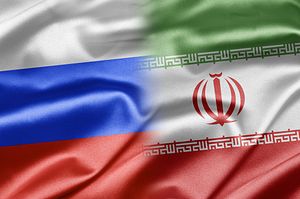On January 20, Russian Defense Minister Sergei Shoigu and his Iranian counterpart, Defense Minister Hossein Dehghan, signed an intergovernmental agreement on “long term and multifaceted” military cooperation in Tehran, Iran. It is the first time in 15 years that a Russian defense minister has visited Iran and underlines the growing military and diplomatic ties between both countries united by their joint opposition to U.S. foreign policy in the Middle Eastern region and beyond.
According to Sputnik News, defense minister Hossein Dehghan is quoted as saying that during bilateral discussions, “the importance of the need to develop Russia and Iran’s cooperation in the joint struggle against meddling in the affairs of the region by external forces that are not part of it was framed.” Dehghan noted that they singled out the U.S. policy that “meddles in the domestic affairs of other countries” as a major reason for the deteriorating security situation in the Middle East and the rest of the world today.
According to the Associated Press, Dehghan furthermore emphasized that, “Iran and Russia are able to confront the expansionist intervention and greed of the United States through cooperation, synergy and activating strategic potential capacities. … As two neighbors, Iran and Russia have common viewpoints toward political, regional and global issues.”
For example, Russia and Iran are both continuing their support of the Assad regime in Syria.
As of now, there are two major obstacles to deeper Iranian-Russian military cooperation. First, Moscow has to persuade Tehran to withdraw its lawsuit from the OSCE Court of Conciliation and Arbitration Geneva. In 2007, Russia agreed to sell five S-300PMU-1/SA-20 Gargoyle SAM systems (40 launchers) to Iran for $800 million. However, as a consequence of a UN Security Council resolution of June 2010 imposing sanctions — which included a ban on the sale of modern weapons — on Iran over its controversial nuclear program, Russia cancelled the delivery of the missiles and stopped all military-technical cooperation. In return, Iran demanded $4 billion in compensation.
Interestingly, a resolution of this problem appears to be imminent: according to media reports both countries have agreed to settle their differences. No specific details have emerged so far.
Second, full-fledged military cooperation between Iran and Russia can only happen once UN sanctions have been lifted. This largely depends on Tehran’s willingness to reach a mutually acceptable agreement in the P5+1 negotiations over Iran’s nuclear program. Only then can full-fledged arms sales resume. In October 2011, Russia made its last and so far only public arms sale to Iran in the form of a radar-jamming station. Back in the year 2000, Iran was the fourth largest importer of Russian military equipment placing right after China, India, and the United Arab Emirates, buying 6.1 percent of Russia’s total arms exports. Sputnik News quotes the Center for the Analysis of World Arms Trade in Moscow, which estimated that the Russian defense industry has lost around $13 billion in arms sales due to UN sanctions against Iran.
For now, the military cooperation agreement focuses on deeper cooperation in the field of counter-terrorism, exchanges of military personnel for training purposes, and an increase in the number of reciprocal port visits by the Iranian and Russian navies. Russia’s stance vis-à-vis Iran is intrinsically connected to its relations with the Western world. Should NATO-Russia relations deteriorate further, Moscow will make an even stronger effort to improve ties with Tehran.

































